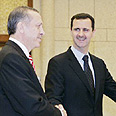
Turkish PM Erdogan (L) and Assad. Resume talks in 10 days
Photo: Reuters
Israel and Syria will resume indirect peace talks shortly mediated by Turkey, Turkish and Israeli government officials said on Friday.
Israel and Syria on Wednesday announced they had begun an open dialogue with the aim of a comprehensive peace, the first confirmation of negotiations between the long-time enemies in eight years.
Double Duty
(VIDEO) 'Syrians know what we want, and we know what they want,' PM tells visiting French foreign minister, adding that negotiations with Palestinians are 'serious and important'
"The two parties agreed to meet regularly. The next round will be in Istanbul in a week or in 10 days," said a Turkish government official, who declined to be named.
IsraeliPrime Minister Ehud Olmert's spokesman Mark Regev also confirmed he expected another round in Turkey shortly.
Turkey, which has good ties with both Israel and Syria, hosted three days of talks in Istanbul earlier this week.
Israel set terms for concluding a peace deal with Syria on Thursday, closing ranks with Washington in demanding Damascus distance itself from Iran and stop supporting Palestinian and Lebanese militants.
The United States, in its initial public reaction to Israeli-Syrian contacts, said it did not object to talks but repeated its criticism of Syria's "support of terrorism.”
Turkish newspaper Sabah reported on Friday that Syrian and Israeli delegations communicated via written statements and did not meet each other during this week's talks, although they were staying at the same hotel.
Syria is demanding the return of the Golan Heights, a plateau overlooking Damascus on one side and the Sea of Galilee on another, which Israel captured in the 1967 Six Day War.
Olmert has spoken of "difficult concessions" Israel would have to make in any land-for-peace accord with Syria. But he has not said publicly that Israel would give up the entire area.
Many analysts say US hostility to Damascus and to its Iranian and Lebanese Hizbullah allies makes a Syrian-Israel deal unlikely before President George W. Bush leaves office in January.















